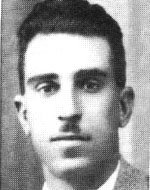Nimrodi, Eliyahu
Son of Tufha and Sasson. He was born in 1905 in Baghdad, the capital of Iraq. The third son of a family of nine children. In Baghdad, Eliyahu studied in a “Talmud Torah” and together with the Torah he absorbed, love for the Land of Israel was born, a love that burned like fire in his bones. At the age of 16, Eliyahu decided to leave behind his family and, on his way to Eretz Israel, went on his own way. He settled in Jerusalem and worked in various odd jobs until he learned the profession of leadership and became a driver. As driver and owner of a vehicle, he filled many Haganah missions to Iraq and Iran. He wandered around the country, in and out of the truck, and with a “wandering circle” he set up, traveled around the Judean Desert and around Jerusalem. Eliyahu had a great sense of humor, he had a great and true friendship, and thanks to all this – and his love of man – many loved him. He helped a lot of others with real help and a good word. Eliyahu, who had an evening voice, used to pass before the ark as a cantor in the “Aaron” synagogue in the Beit Yisrael neighborhood of Jerusalem. The difficult economic situation in Israel forced him to return to Iraq for a short period, but his longing for the country overcame him and he returned – this time managing to bring one of his brothers with him. When he returned to Israel he joined as an active member of the Haganah and married a wife. Eliyahu was one of the first workers in the potash factory in Sodom and drove the water tanker that brought water to the factory. A new facet of his personality was discovered in the factory; because of his command of the Arabic language, he became the mediator and the liaison between the Jewish workers and the Arabs. He settled disputes and everyone respected him greatly. In addition to his work as a driver, he handled the factory’s routine security matters. On 27 Cheshvan, 23.11.1935, a group of Haganah members went out to practice throwing a grenade, and Eliyahu was seriously wounded by shrapnel from a grenade and was taken to the northern factory and from there to a hospital in Jerusalem. He died of his wounds and was buried in the cemetery on the Mount of Olives, and his grave was destroyed by the Jordanians and no trace of him remained. He left a wife, Naomi, daughters, parents, four brothers and four sisters. An article in his memory was published in the book “The Defense of Sodom.”
